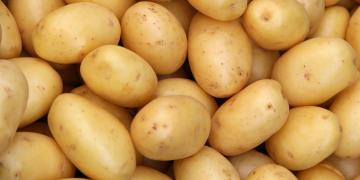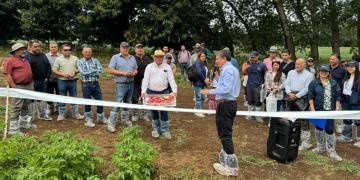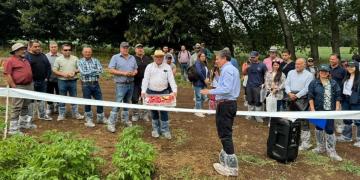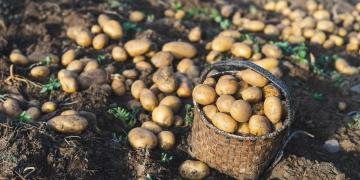Germany: Cicadas spread in potato fields
It spreads rapidly, transmits pathogens, and causes massive crop losses: the reed glasswing. Will this have consequences for food prices and consumers?
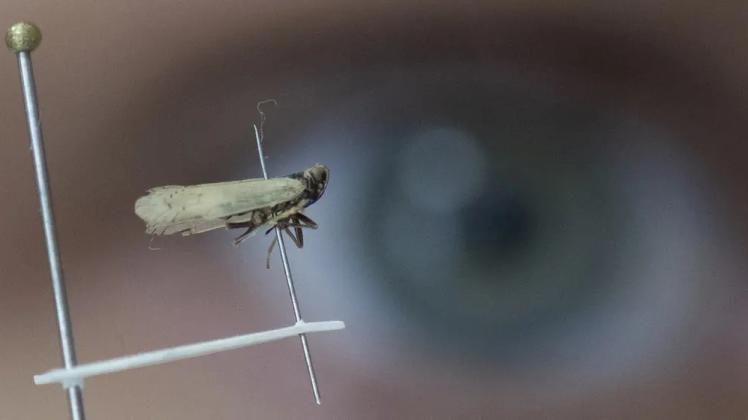
The tubers become shriveled and soft and "look like small, crumpled rubber balls" – this is how Klaus Amberger describes potatoes infected with pathogens caused by the reed glasswing planthopper. Amberger is managing director of the "Pfälzer Grumbeere" producer association, which includes more than 260 potato farmers.
Everyone is worried about their late potato harvest, which begins at the end of August. The pest has now spread throughout the Palatinate region. Infected potatoes are harder to store and process, and can no longer be sold; they usually end up as animal feed.
Sick sugar beet plants damaged by the reed glasswing leafhopper in a field in Rheinhessen.
Small pest, big damage
The flying insect is less than a centimeter long and, in the worst case, can destroy entire crops. The reed glasswing cicada actually lives in grass and shrubs and is increasingly targeting native vegetable crops.
The cicadas feed on the plants and thus transmit two bacterial pathogens, including the plant disease stolbur. The pathogens are harmless to humans, and infected potatoes are generally safe to eat.
Cicada-borne diseases were first discovered on sugar beets in Germany in 2008. Since then, the insect has continued to spread – from Baden-Württemberg through Rhineland-Palatinate, Bavaria, and Hesse further north. And it is establishing itself in more and more vegetable crops. Initially only in sugar beets, then in potatoes, and now also in carrots, beets, chard, and onions.
Up to 50 percent crop losses
The Federal Ministry of Agriculture reports significant quality and yield losses in affected crops. Last year, more than 100,000 hectares of potatoes and sugar beets across Germany were infested by the glassy-winged leafhopper. In some cases, crop losses of up to 50 percent were recorded.
The German Farmers’ Association expects a "significant worsening of the situation" this year and warns that the basic supply of domestic food is "acutely at risk." The German Farmers’ Association cannot yet estimate the extent of this year’s crop losses and how this will affect potato prices. It is too early for that, because the potato harvest lasts until October.
The cicada problem no longer affects individual farms or regions, confirms the Julius Kühn Institute (JKI), the Federal Research Institute for Cultivated Plants. It now affects entire value chains – from cultivation and processing to food supply.
The JKI is researching, among other things, crop cultivation and biological approaches such as trap plants to combat the leafhopper and its pathogens and is working on the development of resistant varieties. According to the JKI, the high population density of the reed glasswing leafhopper threatens a severe infestation and spread to other crops in the coming years.
More pests in the future due to climate change
The Federal Office of Consumer Protection granted several emergency approvals for pesticides in the spring to contain the spread this summer. Farmers in severely affected regions were able to spray insecticides, including on sugar beets, potatoes, and carrots—but only in limited quantities and for a short period of time.
This was too late, criticizes the Farmers’ Association, as the cicada has already spread to almost all German states. Association President Joachim Rukwied is therefore calling for faster approval of pesticides. There is currently no officially approved insecticide for potato cultivation that can be used to combat the glassy-winged leafhopper.
Individual measures are no longer sufficient
Whether the use of insecticides was successful can be determined in part in the coming weeks up to harvest based on the severity of symptoms in the field, but the full extent of the results will only become apparent next year, explains Sabine Andert, head of the Institute for Plant Protection in Arable Crops and Grassland at the JKI.
The reason: The damage to potatoes and sugar beets was already caused by the larvae this year. The potential effect of the insecticide treatments, namely preventing adult insects from mating and laying eggs, may not become apparent until next year.
"Individual measures such as the use of insecticides will not be sufficient," says Andert. These alone will not prevent the cicada from multiplying and spreading. Long-term, cross-crop measures are needed. Agriculture must prepare for the fact that pests such as the reed glasswing will become more common in the future. "Climate change promotes their spread, as does global trade, which introduces new, invasive species." The JKI is working on developing climate-adapted cultivation systems.
Research still relatively early
"We knew almost nothing at the beginning," says agricultural scientist Helen Pfitzner. She coordinates cicada research at the Hessian-Palatinate Sugar Beet Growers Association and the Union of the German Potato Industry (UNIKA). "We need to get even faster," she says, because the cicada spreads incredibly quickly and is adaptable.
"We are actually watching an insect evolve," adds Sabine Andert. A native insect has left its ecological niche, first adopting sugar beets as a host plant, and then switching hosts to potatoes. This is a "completely new situation, unprecedented in its kind," and one that researchers, authorities, and agriculture are dealing with.
While this is exciting from a scientific perspective, it also threatens the livelihoods of farmers. Jobs and wages are at stake, including in the food processing industry. And there’s a risk that domestic products could become scarce and expensive.
Some potato farmers have already responded, like Fabian Schneider from Dirmstein. He no longer grows late potatoes at all, saying it’s no longer profitable in the long term. Schneider is now focusing on early potatoes, which are ready for harvest in early summer.
Fuente: tagesschau.de

